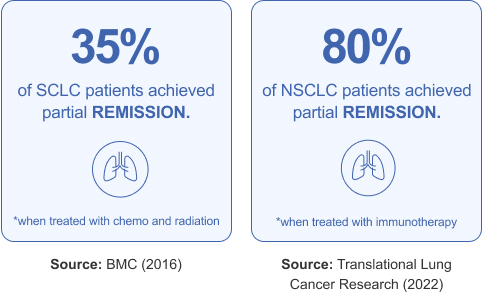Lung Cancer Life Expectancy
In general, life expectancy for asbestos lung cancer ranges from 7-16 months. Fortunately, lung cancer patients can receive treatments to improve their life expectancy and become survivors. Some patients have lived for 15 years or more with the right medical care.
What Is the Life Expectancy of Lung Cancer?
 The life expectancy of lung cancer is how long you are expected to live after a diagnosis.
The life expectancy of lung cancer is how long you are expected to live after a diagnosis.
Lung cancer has an overall life expectancy of less than two years, which is less favorable than many other cancer types. However, treatments may help you outlive the average lung cancer life expectancy and become a long-term survivor.
Lung cancer life expectancy depends on various factors, including your health, the type of lung cancer you have, and the cancer stage. Doctors will take all of these into account when coming up with a treatment plan to help you live longer.
Get a free case review now for help paying for asbestos lung cancer treatments that may improve your survival time.
- Access Financial Aid and Justice
- Learn About Your Options
- Contact Us for Free

Lung Cancer Life Expectancy vs. Survival Rate
Many people confuse the terms “life expectancy” and “survival rate”. While both are important parts of an asbestos lung cancer prognosis, they aren’t the same.
- Life expectancy is the amount of time doctors think you’ll live after a diagnosis.
- Survival rates measure the percentage of people with the same stage and type of cancer who are still alive after a certain period of time (usually years).
The average 5-year survival rate for lung cancer is 18.6%, according to the American Lung Association (ALA). Treatment can help improve lung cancer survival rates and life expectancies.
Lung Cancer Life Expectancy by Type
Life expectancy varies with each of the three lung cancer types: non-small cell lung cancer (NSCLC), small cell lung cancer (SCLC), and lung carcinoids. Find the life expectancies for every type below.
Life Expectancy for Non-Small Cell Lung Cancer
Non-small cell lung cancer is the most common type of lung cancer and is less aggressive than SCLC. The overall life expectancy for NSCLC is 11-13 months, according to a 2020 study.
NSCLC can also be classified into several subtypes, and each subtype has its own life expectancy.
Life expectancies for NSCLC subtypes include:
- Adenocarcinoma: 25.82 months
- Large cell carcinoma: 11-14.2 months
- Squamous cell carcinoma: 10.1-12.9 months
Diagnosed with NSCLC? Call (877) 446-5767 to learn if you qualify for compensation to pay for life-extending treatments.
Small Cell Lung Cancer Life Expectancy


You can live longer with SCLC if you’re diagnosed before the cancer has spread.
Lung Carcinoid Life Expectancy
Lung carcinoid tumors are very rare but are much easier to treat compared to NSCLC or SCLC.
Patients with lung carcinoid tumors have an average life expectancy of 5.6 years, according to a 2021 report published in Lung Cancer.
Life Expectancy for Asbestos Lung Cancer
Patients with asbestos-related lung cancer have the same life expectancy as those with lung cancer not caused by asbestos.
Asbestos exposure can cause any of the other types of lung cancer listed above, with your life expectancy varying based on which type you have.
Lung Cancer Life Expectancy by Stage
Lung cancer stage greatly affects life expectancy. If you’re diagnosed in an earlier stage, metastasis (cancer spread) won’t have occurred, so the cancer will be easier to treat and you could live longer.
There are four stages of NSCLC and two stages of SCLC.
NSCLC life expectancy statistics by stage:
- Stage 1 and Stage 2: 33-55 months
- Stage 3: 12-28 months
- Stage 4 (metastatic): 4-9 months
SCLC life expectancy statistics by stage:
- Limited-stage SCLC: 12-16 months
- Extensive-stage SCLC: 7-11 months
Doctors can recommend treatments that may help you live longer no matter which stage of lung cancer you have.
Get a free case review to learn if you qualify for compensation to help cover the costs of life-extending lung cancer treatments.
- Access Financial Aid and Justice
- Learn About Your Options
- Contact Us for Free




What Affects Lung Cancer Life Expectancy?
Besides type and stage, other risk factors can affect your lung cancer life expectancy.
These factors include:
- Early detection: Tests like lung cancer screenings can help diagnose you at an earlier stage, sometimes even before symptoms appear. An early lung cancer diagnosis typically gives you more treatment options to improve your life expectancy.
- Patient age: Your life expectancy may be better if you’re a younger person. A study from Oncology Letters revealed that older lung cancer patients have significantly poorer health outcomes.
- Patient health: If you’re in good overall health at the time of diagnosis, you’re more likely to tolerate major treatments that can help you live longer, like surgery. Lung cancer patients with pre-existing heart and lung problems generally have poor prognoses.
- Patient sex: Women with lung cancer generally have slightly better outcomes than men.
Your doctor can explain how unique factors in your case may impact your asbestos lung cancer life expectancy.
How Treatments Improve Lung Cancer Life Expectancy
Arguably the best way to improve your life expectancy is to undergo lung cancer treatments. These treatments allow doctors to remove or shrink cancer tumors, which may give you more time to spend with your family.
Commonly used lung cancer treatments include:
- Surgery removes the lung cancer tumor along with part or all of a lung. NSCLC patients who received surgery lived for 76.7 months on average, according to a 2023 review of Surveillance, Epidemiology, and End Results (SEER) data.
- Chemotherapy uses drugs to kill cancer cells. Patients with late-stage NSCLC lived for over 9 months on average when chemotherapy was used alone, as noted in a 2023 study from The Lancet. In addition, chemotherapy may help patients live even longer when used with other treatments.
- Immunotherapy boosts the immune system to fight cancer. Patients with metastatic NSCLC lived for 13.37 months on average when they received both immunotherapy and chemotherapy, according to a 2023 Biomedicines report.
- Radiation therapy uses energy beams from protons and X-rays to kill cancer cells. Patients with advanced SCLC who received radiation and immunotherapy had a median survival of 11 months in a 2021 review of National Cancer Database statistics.
- Targeted therapy blocks mutations found in cancer cells to kill them. According to a 2023 review of studies published in Cancer Cell International, this treatment can help patients live cancer-free for a few months to several years.
Doctors typically combine different treatments to remove as much of the cancer as possible, which may boost a patient’s life expectancy.
Contact us now to find out if you qualify for lung cancer compensation. Asbestos lung cancer treatment costs can add up, but we’re here to help you afford them.
What Is Lung Cancer Life Expectancy Without Treatment?
It’s important to get treated for asbestos lung cancer to improve your life expectancy.
Here are the average lung cancer life expectancies without treatment:
- NSCLC: NSCLC patients who did not receive treatment only had an overall survival time of 7.15 months, according to a report published in Systematic Reviews.
- SCLC: Untreated SCLC patients live for 2-4 months, as noted by a study from Breathe.
Getting treatment may give you more time to make memories with your loved ones. Even patients who were diagnosed with advanced cancer have lived for 15 years or more in some cases.
Lung Cancer Survivors
Lung cancer survivors have outlived average life expectancies, becoming beacons of hope for others diagnosed.
Long-term lung cancer survivors include:
- Deborah, 24-year survivor: Deborah underwent lung cancer surgery less than a week after her adenocarcinoma diagnosis in 2000 and is still living a full life today.
- David, 22-year survivor: A routine heart scan led to David’s diagnosis in the early 2000s. David survived thanks to several surgeries and has become an advocate for lung cancer research.
- Jim, 19-year survivor: Jim was diagnosed with asbestos lung cancer and underwent aggressive treatments like surgery, chemotherapy, and radiation, which beat the cancer back.
- Emily, 11-year survivor: Diagnosed with stage 4 NSCLC after never having smoked, Emily worked with top doctors to get treatments and has been cancer-free ever since.
Survivors like these should remind you that it’s possible to beat the odds and live a long time with lung cancer, even if you’ve been given an unfavorable life expectancy at first.
Get a free case review for help paying for the treatments needed to improve your life expectancy, so you can work toward becoming a lung cancer survivor.
- Access Financial Aid and Justice
- Learn About Your Options
- Contact Us for Free




Get Help Improving Your Lung Cancer Life Expectancy
With the right treatments, your asbestos lung cancer life expectancy could change for the better, giving you more precious time with the ones you love.
It’s possible to live for 15 years or more — even with late-stage lung cancer.
Lung cancer treatments can be costly, but our team may be able to help you pursue financial compensation to cover expenses. This will allow you to focus on getting life-extending treatments without worrying about how to pay for them.
Call (877) 446-5767 or get a free case review to find out your eligibility for compensation to cover your treatment bills and any other expenses.
Lung Cancer Life Expectancy FAQs
How long can you live after being diagnosed with lung cancer?
Most lung cancer patients live 7-16 months after being diagnosed. However, It may be possible to live for 15 years or more with lung cancer depending on the specifics of your case.
You can improve your lung cancer life expectancy by getting treated soon after your diagnosis is confirmed.
How quickly does lung cancer spread?
Lung cancer can spread to other parts of the body very quickly without treatment, which can worsen your overall life expectancy.
Numerous studies have shown that lung cancer tumors can double in volume in just a few months to a few weeks.
By working with your lung cancer doctors, you may be able to get treatments that can help you live longer.
Worried about how you’ll pay for lung cancer treatment costs? We can help. Call (877) 446-5767 to learn more.
Is lung cancer usually terminal?
Lung cancer is not always terminal, even when it’s diagnosed in an advanced stage.
You have a better chance of surviving lung cancer if you’re diagnosed and treated before the cancer spreads. However, treatments have helped many patients whose cancer was considered terminal to become long-term survivors.
Is lung cancer curable?
There isn’t a universal cure for lung cancer, but some patients are informally cured if doctors find no evidence of disease (NED) following treatments.
Early-stage lung cancer patients are more likely to achieve NED with aggressive treatments. It’s also possible to become cancer-free even if you’re in a later stage.
Get a free case review to see if we may be able to help you pay for treatments that could cure you or improve your survival time.
What is the life expectancy of someone with adenocarcinoma?
The average life expectancy of adenocarcinoma of the lung is 25.82 months, according to a January 2023 study published in Thoracic Cancer.
Adenocarcinoma lung life expectancies are better for patients whose tumors haven’t metastasized (spread).
What is the stage 4 lung cancer life expectancy without treatment?
The stage 4 or metastatic lung cancer life expectancy without treatment is only a few months.
In addition, 25% to 30% of patients with stage 4 NSCLC who do get treatment pass away within 3 months of diagnosis, according to a 2021 study from Frontiers in Oncology.
However, the remaining stage 4 patients lived for over 23 months on average in the study, showcasing the importance of getting treated.

